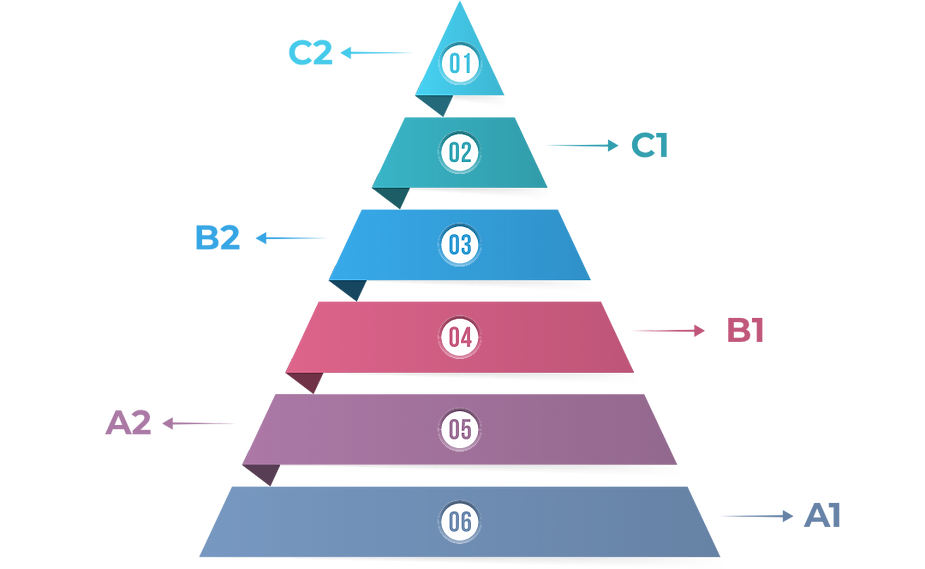
What is Goethe Exam? (Was ist die Goethe-Prüfung?)
The Goethe-Institut offers German Language Proficiency exams worldwide those how want to opt German Language Proficiency at levels A1 - C2 of the Common European Framework of Reference for Languages (CEFR). Quality standards during the growth, management, and application of the German exams are a crucial part of the work.
With success! Goethe certificates are appreciated worldwide as an internationally standard proof of language knowledge for visa procedures, professional acknowledgement, or registration at a university.
Why Goethe Exam? (Warum die Goethe-Prüfung?)
The Goethe-Zertifikat is highly praised by all universities in Germany or German-speaking nations as proof of language proficiency for study abroad or vocational training, or career prospects. The Goethe-Zertifikat is also accepted for university admission in Austria and Switzerland.
Whether you're in India or online, the German4Germany is your meet-the-criteria partner. We guarantee swift progress thanks to certified and expert trainers, state-of-the-art teaching methods, intensive support and mentoring, and a course level system that is internationally recognised.
Goethe Exam Pattern (Goethe-Prüfungsmuster)
The Goethe Exams are based on the six levels (A1-C2) of the Common European Framework of Reference for Languages (CEFR). Depending on the level, a guided study is conducted to prepare for the Goethe exam.
The exam is divided into 4 parts:
-
Listening (Hören)
-
Reading (Lesen)
-
Writing (Schreiben)
-
Speaking (Sprechen)

Goethe A1 exam preparation (Prüfungsvorbereitung)
A1 level is the elementary level. To prepare for the Goethe German A1:
-
Exercise reading and understanding texts, such as brief notes, ads, notices, and prints.
-
Additionally, work on filling out essential documents and writing short texts about yourself or random everyday topics.
-
During the exam, you will also be required to pay attention to short everyday conversations. So, organise accordingly.
Goethe A2 exam preparation (Prüfungsvorbereitung)
German A2 level is the pre-intermediate level and prepares for Goethe German A2:
-
Recite texts, like emails, simple articles, or short stories.
-
Furthermore, practice writing short texts on familiar matters, such as describing your interests, daily practices, or events that you recently came across.
-
Also, listen to discussions, podcasts, or watch videos in German. Try to understand the context of the situation.
Goethe B1 exam preparation (Prüfungsvorbereitung)
B1 level is considered an intermediate level. To prepare for Goethe German B1:
-
Improve your reading with articles or short stories. Pay attention to identify the main ideas, vocabulary, and exact details.
-
Work on composing letters, emails, or essays on several topics. Focus on coherence, grammar, and vocabulary usage.
-
Practice listening to a variety of audios, including conversations, interviews, or news reports.
-
Work on understanding spoken language, identifying key information, and following the situation.
-
Lastly, try to express your opinions clearly.
Goethe B2 exam preparation (Prüfungsvorbereitung)
German B2 is the upper intermediate level. So, to prepare for Goethe German B2:
-
Increase your vocabulary and extend your understanding of complex grammar formations. Exercise reading a variety of texts like long articles or literary and professional documents.
-
Work on composing essays or formal letters.
-
Finally, practice speaking German through discussions, debates, and presentations to express yourself confidently.
Goethe C1 exam preparation (Prüfungsvorbereitung)
C1 is the advanced level in German. To prepare for the Goethe German C1 level:
-
Understand advanced terms in different topics. Improve your understanding of complex grammar structures and sentence formations.
-
Practice reading inspiring texts, such as abstract papers, literature, or opinion bits.
-
Compose well-structured essays, reports, or critical analyses.
-
Additionally, being involved with complex audio materials, such as lectures, presentations, or debates, will help a lot.
-
Engage in practice supplements to refine your fluency and ability to comprehend complex ideas.
Goethe C2 exam preparation (Prüfungsvorbereitung)
Goethe German C2 is considered to be close to a native level; hence, to prepare for it:
-
Advance your vocabulary across several fields. Develop a deep understanding of complex grammar structures and sentence creation.
-
Read demanding texts, such as academic papers, literature, or professional articles.
-
Finally, produce complex essays, research papers, or formal reports on various and interesting topics.
Each segment of the exam is planned to evaluate specific language proficiencies. To pass the Goethe exam, you must get at least 60%, and all sections of the exam must be completed.
Benefits of Clearing the Goethe Exam (Vorteile des Bestehens der Goethe-Prüfung)
Getting a Goethe-Zertifikat can lead to several openings. Since many companies regard this qualification, it might perk up your chances of landing a job. It’s also an excellent option if you intend to study in Germany or want to demonstrate your commitment to personal and professional development. Below are a few important benefits of getting the Goethe certification:
-
Globally recognized
-
Curriculum Structure
-
Transparent
-
Flexible
-
Lifetime Validity
Which Goethe Exam is the Right One for Me? (Welche Goethe-Prüfung ist die richtige für mich?)
As you have learned about how to prepare for the Goethe exam and its reputation, you might be thinking of which exam is appropriate for you.
Picking the right Goethe exam depends on your existing level of German proficiency and your goals. Here’s a breakdown of the Goethe exams based on the Common European Framework of Reference for Languages (CEFR):

1.) Goethe-Zertifikat A1 (Goethe-Zertifikat A1 (Start Deutsch 1))
Level: Elementary (A1)
Purpose: A1 level of German is the best for those who are just starting the German language journey. The A1 level syllabus makes it possible to understand and use common day-to-day terms and basic sentences.
Who it’s for: This assessment is ideal for individuals who are applying for a German visa.
Exam: Deutsch 1 (SD1) from the Goethe-Institut
2.) Goethe-Zertifikat A2 (Goethe-Zertifikat A2)
Level: Pre-Intermediate (A2)
Purpose: The goal is for German learners at the A2 level to have a good vocabulary bucket and its comprehension. They can understand phrases and commonly used terms about relevant topics. Additionally, they can relate to relatively basic tasks, requiring a candid exchange of information on everyday and familiar subjects.
Who it’s for: This test is intended for anyone who desires to improve their expertise of the German language.
Exam: Deutsch 2 (SD2) from the Goethe-Institut
3.) Goethe-Zertifikat B1 (Goethe-Zertifikat B1)
Level: Intermediate (B1)
Purpose: Learners can start to manage more difficult language coursework at the B1 level. They can write easy-to-understand, clear texts on subjects they are familiar with. Also, they can quickly explain their thoughts and goals and provide reasons and explanations for past experiences, events, aspirations, desires, and objectives.
Who it’s for: This test is ideal for candidates who aim to study at particular German establishments or who plan to move to Germany.
Exam: Zertifikat Deutsch (ZD) & TestDaF
4.) Goethe-Zertifikat B2 (Goethe-Zertifikat B2)
Level: Upper-Intermediate (B2)
Purpose: Learners understand major concepts in complicated texts on both perceptible and theoretical subjects, including technical conversations in their area of proficiency. With the help of the B2 level, they can communicate with enough flexibility and creativity to enable regular, stress-free communications with native speakers.
Who it’s for: This exam is important for individuals who want to get admission in the best universities in Germany or for working professionals who want to get better job openings.
Exam: Zertifikat Deutsch für den Beruf (ZDfB) & TestDaF
5.) Goethe-Zertifikat C1(Goethe-Zertifikat C1)
Level: Advanced (C1)
Purpose: Students at the C1 level can understand a variety of challenging, longer texts. After this advanced level, students are able to communicate clearly and naturally without having to actively look for words.
Who it’s for: This exam is highly recommended for those who want to practise higher education in Germany or work in fields where advanced German is needed.
6.) Goethe-Zertifikat C2 (Goethe-Zertifikat C2 (Großes Deutsches Sprachdiplom))
Level: Proficient (C2)
Purpose: This is the most advanced level of language proficiency. Learners can easily hold almost everything they hear or read. They are capable of making creative and efficient use of language in every required context.
Who it’s for: It is suitable for those seeking to prove 100% language proficiency, such as those teaching German or working in high-level professions.
How to Choose:
Beginner & Pre-Intermediate Learner: A1 or A2
Everyday Use or Basic Residency Requirement: B1
Study or Work in Germany: B2 or C1
Advanced Proficiency for Academic or Professional Fields: C1 or C2
Is the Goethe exam difficult? (Ist die Goethe-Prüfung schwierig?)
For beginners at A1 or A2 levels, the exam may be challenging as it tests foundational knowledge and basic language skills. As one proceeds to higher levels such as B1, B2, and beyond, the difficulty of the exam increases. A deeper understanding of grammar, vocabulary, and advanced language usage is required.
However, with preparation and practice, it is possible to crack the Goethe exam at any level.
German Language Course by German4Germany is a complete Goethe exam preparation course. They help you approach the exam with an intensive study plan and appropriate study materials. Furthermore, they enable you to engage in steady practice to enhance language skills and increase your confidence.
How German4Germany Prepares German Language Learners? (Wie bereitet German4Germany Deutschlernende vor?)
Planning or dreaming of studying or working in Germany or German-speaking nations? Most colleges, universities, and employers require qualified proof of your knowledge in German Language Proficiency. An internationally recognized certificate will enable you to prove your knowledge.
The exam training offers a thorough understanding of all exam patterns and their structure. This allows you to ideally prepare for the exam segments and elements: listening, reading, writing, and speaking. A practice test is planned like the real exams: the identical structure, the similar task types, and the same number of assignments. We also offer you explanations, tips, topic examples, and word lists.
